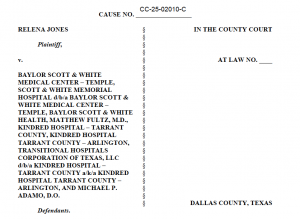WHS guidelines support early two-stage surgery for Stage IV pressure injuries, yet many facilities fail to provide this care, risking serious complications
SANTA BARBARA, CA, UNITED STATES, June 9, 2025 /EINPresswire.com/ -- “Clearly, the standard of care as described by the Wound Healing Society advocates for an early two-stage surgical strategy for patients suffering Stage IV hospital-acquired pressure injuries. First, timely debridement with application of a VAC pack, and then flap coverage,” states Greg Vigna, MD, JD, Board Certified Physical Medicine and Rehabilitation.
Dr. Greg Vigna, national malpractice attorney, states, “Our client in this Texas lawsuit developed hospital-acquired Stage III and Stage IV decubitus ulcers and was transferred to Kindred for further care. However, they were not offered treatment for cure and were discharged to nursing homes without receiving the standard of care. Specifically, the “two-stage surgical strategy” recommended by the Wound Healing Society Guidelines, which supports early flap closure to avoid complications such as malnutrition, sepsis, and septic shock."
What does the WHS Guidelines 2023 update report?
“Preamble: Surgical treatment of pressure injury/ulcers is often considered to be a final invasive choice for wounds refractory to less aggressive care or for use when rapid closure is indicated, however, recent literature suggests that surgery can and should be performed safely in properly selected patients.
Guideline 6.8: A pressure ulcer should be closed surgically if it does not respond to wound care and there is no other contraindication to the surgical procedures. Exceptions may include the elderly or patients with a fatal illness, for whom palliative, local wound care is more appropriate. (Level I – increased).
Principle: Wound closure decreases protein loss, fluid loss, the possibility of wound infection, and the later development of malignancy in the wound. Early complication rates are acceptably low."
Read the WHS Guidelines: https://onlinelibrary.wiley.com/doi/full/10.1111/wrr.13130
What does the “two-stage surgical strategy” as described by Dr. Johan Andrianasolo, in BMC infectious disease (2018) 18:166 conclude?:
“Pressure ulcer-related pelvic osteomyelitis is a difficult-to-treat clinical condition, generating an important consumption of broad-spectrum antibiotics. The lack of correlation between outcome and the debridement to reconstruction interval argue for a short sequence to limit the total duration of treatment.”
Read Dr. Andrianasolo article: https://pmc.ncbi.nlm.nih.gov/articles/PMC5894174/
Dr. Vigna states, “As a practicing rehabilitation physician of a Long-Term Acute Care Hospital (LTAC), I developed a busy flap program, as surgical flap procedures have long been the standard of care for serious wounds. It is clear from the WHS guidelines and current literature that LTACs advertising specialized wound care programs, while billing for these services, are failing to meet this standard and exposing this vulnerable class of patients to serious complications and death.”
What is the prognosis for a patient with a pelvic Stage IV decubitus ulcer complicated by osteomyelitis?
“Among patients with decubitus-related osteomyelitis who did not undergo myocutaneous flapping, outcomes were generally poor regardless of treatment, and not significantly improved with prolonged antibiotics,” states Dr. Damioli.
Read Dr. Damioli’s article: https://journals.sagepub.com/doi/full/10.1177/20499361231196664
Dr. Vigna concludes, “National LTACs, such as Vibra, Select Medical, Kindred, as well as certain local providers, continue to advertise wound care programs they know lack the capability to provide the standard of care for Stage IV pressure injuries, which includes flap closure. Instead, they provide inadequate treatment, exposing vulnerable patients to resistant organisms, poor outcomes, and unnecessary prolonged suffering.”
Greg Vigna, MD, JD, is a national malpractice attorney and an expert in wound care. He is available for legal consultation for families and patients who have suffered decubitus ulcers due to poor nursing care at hospitals, nursing homes, or assisted living facilities. The Vigna Law Group, along with Ben C. Martin, Esq., of the Ben Martin Law Group, a Dallas, Texas national pharmaceutical injury law firm, jointly prosecute hospital and nursing home neglect cases that result in bedsores nationwide.
Case: Case: CC-25-02010-C
Dallas County, Texas
Greg Vigna, MD, JD
Vigna Law Group
+1 817-809-9023
email us here
Visit us on social media:
LinkedIn
Facebook
X
Legal Disclaimer:
EIN Presswire provides this news content "as is" without warranty of any kind. We do not accept any responsibility or liability for the accuracy, content, images, videos, licenses, completeness, legality, or reliability of the information contained in this article. If you have any complaints or copyright issues related to this article, kindly contact the author above.



